Select Language
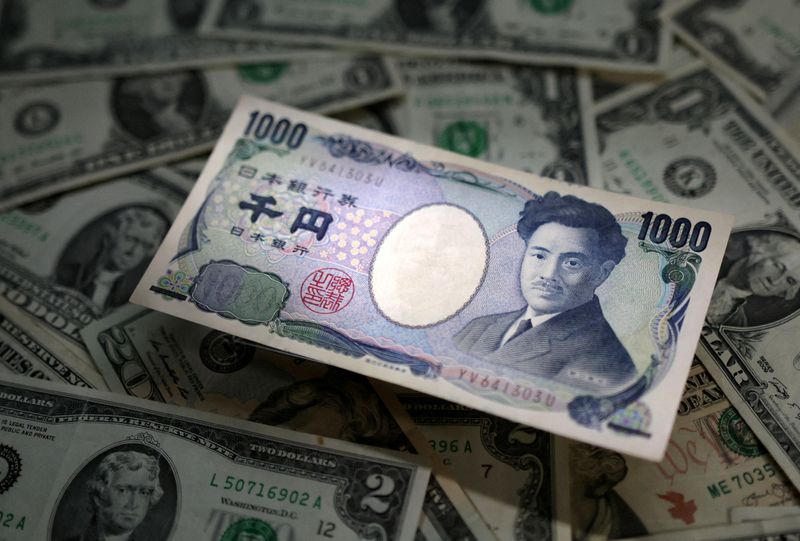
TOKYO (Reuters) - Japanese authorities are committed to a flexible exchange rate, which acts as a shock absorber and supports the Bank of Japan's monetary policy objective, a senior International Monetary Fund (IMF) official said on Wednesday.
"We've had very good discussions with Japanese authorities on exchange rate issues. Let me emphasize, I see no fundamental divergence in views between the Fund and Japanese authorities about exchange rate policies," Krishna Srinivasan, director of the IMF's Asia and Pacific Department, told a news conference.
"Japanese authorities are committed to a flexible exchange rate which acts as a shock absorber, and supports the monetary policy objective of price stability," Srinivasan said.

By Aftab Ahmed, Saurabh Sharma and Jatindra Dash
BAHBOLIYA MAHADA, India, (Reuters) - Jakir Khan, an Indian farm worker, says he has cut down on food as his income has halved. There are fewer and fewer opportunities, he says, for employment in his small village in Uttar Pradesh state.
Khan says his monthly income has come down to 5,000 Indian rupees ($60.17) from 10,000 Indian rupees before the pandemic, while his weekly expenses on food have gone up 60%. In November, he took a 100,000 rupees loan from relatives.
Khan, like millions of others, is struggling with the economic slowdown in rural India, home to 60% of its 1.4 billion people, which is painting a starkly different picture to the country's spectacular economic growth and the prosperity of its urban population.
Reuters interviewed nearly 50 families in rural areas such as Khan's in three Indian states - Uttar Pradesh, Odisha and West Bengal - and 85% of them reported stagnant or lower incomes compared to the years before the pandemic. They said inflation was high and was forcing them to borrow money to sustain already reduced consumption.
The families attributed the lower incomes to fewer jobs, more people vying for the same work leading to lesser pay and lower farm output, which reduces the demand for farm labour.
While there have been some indicative data points that show rural recovery has been slow, there is no recent, publicly available survey on incomes and consumption in India's vast rural hinterland.
"Who doesn't want to eat meat? But times are hard and I cannot afford it. I eat meat only in marriage functions of others," Khan said, speaking in Bahboliya Mahada, a village surrounded by sugarcane fields and banana plantations.
India's statistics office has forecast overall annual growth of 7.3%, the highest among major global economies, for the current fiscal year ending in March, fuelled by sectors like construction and financial services.
But growth in farm output, which contributes about 15% of GDP and employs more than 40% of the workforce, was seen slowing to 1.8% in the current fiscal year, from 4% a year ago.
"I am a bit concerned. A host of indicators is not painting a great picture," Dhiraj Nim, an economist at ANZ, told Reuters. These included an increase in seasonally adjusted demand for the government's minimum job guarantee scheme for rural areas, low agriculture growth in the September quarter and rising inflation in the hinterland, he said.
"Industries that tend to be more...rurally focused in terms of employment are also not doing well," he said.
Prime Minister Narendra Modi is seeking a third term in elections due by May this year, and economists say the government might have to spend more on rural subsidies to ease the distress.
Asked for comment, the government's economic policy body, NITI Aayog, said multi-dimensional poverty was estimated to have declined to 11.28% of the population from 29.17% between 2013-14 and 2022-23, or by around 250 million people.
"Of these (114.3 million) belong to Uttar Pradesh, West Bengal and Odisha, the states in which Reuters has conducted this survey," it said in a statement.
"The whole programme of Mr Modi's government has been about inclusion and inclusive growth," NITI Aayog vice chairman Suman Bery told reporters on a visit to Singapore earlier this month.
"To focus on short-term agricultural performance is to neglect all that has happened in providing a whole range of safety nets during COVID and after COVID," he added.
"There is a lot to be done on the structural side but I don't think one can reasonably argue that the overall programme has not been inclusive."
LOWER FARM INCOMES
The rural economy has been hurt by a drop in the output of some key crops, such as wheat, in the past three years due to a rise in temperatures, patchy monsoon rains and falling reservoir levels.
On top of that, higher food inflation has forced the government to ban exports of wheat, some grades of rice and onions to contain prices, but this has hurt farm incomes even more.
Over 44% of the families that Reuters interviewed said they were earning less than before the pandemic years, while about 41% reported the same income levels as before and the rest reported an increase in their incomes.
Brokerage house Motilal Oswal said rural non-agricultural wages have contracted for the second consecutive year, while agricultural wages grew just 0.2%, the lowest growth in 3 years.
It estimates rural spending fell 0.5% in the July-September period.
Arun Kumar, an economist and former professor at New Delhi's Jawaharlal Nehru University, said the gap in incomes between the mostly urban organised sector and the mostly rural unorganized sector "can be anything like a factor of 5".
He said it was hard to quantify the gap as the government has not released detailed consumption data for years.
Higher food inflation is leading to most rural households cutting down on key sources of protein like chicken, lentils, eggs and milk, which are more expensive than cereals and vegetables.
The cut down in food is despite the government providing free foodgrain to 800 million Indians since 2020.
ANZ said in a report that a slow recovery in indicators such as railway passenger traffic while demand for air travel has surged is indicative of the widened consumption inequality.
Nearly 30 families that Reuters spoke to had taken additional debt in the last few months from either commercial banks, local lenders or relatives. Most of this debt was to service their earlier debts or to meet food expenses.
Tilottama Pradhan, a housewife in a small village called Tarada in Odisha, said she had taken a third round of loans of 60,000 rupees from a local lender. She has cut down on meat and fish, and buys locally produced cheaper vegetables.
"We are very cautious with our spending because our income is not increasing .. We have taken a new loan to pay back old loan instalments," Pradhan said.
The Reserve Bank of India (RBI) in a report published last month said 42.7% of customers availing consumption loans already had three live loans at the time of origination and 30.4% of customers have availed more than three loans in the last six months. The report did not specify if the risk build up in consumer loans was seen in rural areas or urban.
URBAN CONTRAST
While rural incomes stagnated in the last few years, median salaries in companies have increased 10% in 2023, following annual increases of 7.5%-9.8% between 2020 to 2022, according to WTW, an advisory and broking company.
That has meant strong demand in urban consumption as seen in sales of items such as smartphones, television and cars.
For instance, SUVs sales rose 22% in 2023, firmly above the pre-pandemic figures, a data point seen as a proxy for strong urban consumer demand. But two-wheeler sales, seen as a proxy for rural consumption, remain lower than pandemic levels despite a 9% rise in 2023.
"India is such a huge country that even if say 100 million do well, that's bigger than most of the European countries," Kumar, the economist, said.
"So the outside people may only see this, what's happening to the 100 million, not what's happening to the 1.3 billion other people. But at some point or the other it will impinge on India's story."
($1 = 83.0950 Indian rupees)
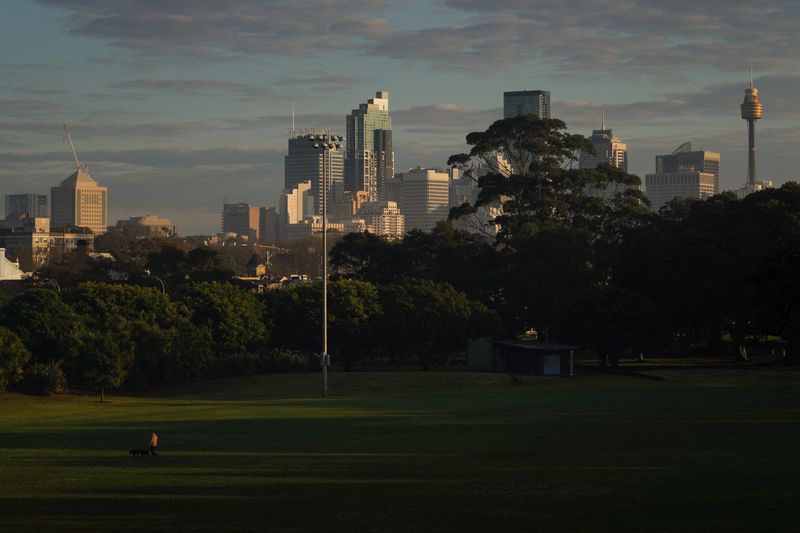
SYDNEY (Reuters) -Australian consumer price inflation slowed more than expected to a two-year low in the fourth quarter, while a sharp deceleration in core inflation prompted markets to bring forward bets of rate cuts.
The price data would be a welcome relief for the Reserve Bank of Australia as it prepares to deliver its first policy decision of the year next Tuesday.
Futures rallied to imply around a 64% probability of a first rate cut in June, up from 54% before the data. A quarter-point cut was now more than fully priced for August and the total easing for 2024 moved to 48 basis points, from 42 basis points.
Data from the Australian Bureau of Statistics on Wednesday showed the consumer price index (CPI) rose 0.6% in the fourth quarter, under market forecasts for a 0.8% increase.
The annual pace of CPI inflation slowed to 4.1%, from 5.4%, and was well below the peak of 7.8% in December 2022.
More encouragingly, the CPI rose 3.4% year-on-year in the month of December, down sharply from 4.3% in November and down more than two percentage points in three months.
A closely watched measure of core inflation, the trimmed mean, rose 0.8% in the fourth quarter, under forecasts of a 0.9% increase. The annual pace slowed to 4.2%, from 5.2%.
The Australian dollar eased 0.3% to $0.6585 after the data, while three year bond futures extended earlier gains to 96.37, the highest level in two weeks.
The RBA has already raised interest rates by 425 basis points to a 12-year high of 4.35% since May 2022 to tame runaway prices. It also left the door open to further tightening if necessary to meet its annual inflation target of 2-3%.
The central bank had expected inflation to ease to 4.5% by December and to return to its target band in late 2025. The central bank will provide updated forecasts next Tuesday
The economy has evolved largely as the RBA had expected over the past two months, with the labour market loosening, consumer spending soft amid costs of living pressures and goods disinflation continuing.
However, the overseas landscape has changed drastically. With inflation abroad falling rapidly, markets are betting the Federal Reserve and European Central Bank would be soon cutting interest rates. They see the first rate cut from the Fed in May and first easing from the ECB in April.
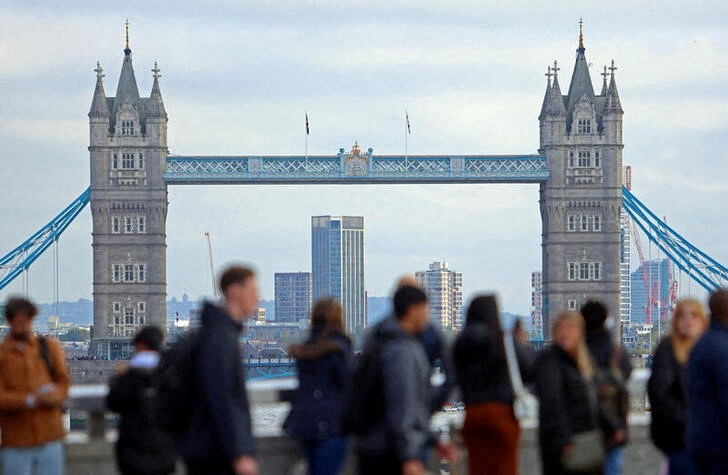
LONDON (Reuters) - British businesses started 2024 with their confidence at the highest level in nearly two years but their plans for more staffing are not translating into accelerating wage growth, according to a survey published on Wednesday.
In a report likely to be welcomed by the Bank of England as it readies its latest interest rate decision, the Lloyds (LON:LLOY) Bank Business Barometer jumped by nine points to 44% this month, its strongest since February 2022.
Hann-Ju Ho, Senior Economist Lloyds Bank Commercial Banking, said weaker inflation and hopes of interest rate cuts pushed the index to its highest level for the month of January since 2016.
"With ongoing geopolitical issues and a general election on the horizon, businesses will have factored these into their risk radars and will be working to prepare for any potential impacts on their trading prospects," he said.
"Also, half of all companies say they’re planning to increase headcount in the coming year. Despite that and the changes to minimum wage that will come into force in April, expectations for staff pay fell back following last month’s increase."
A measure of staffing plans increased by four points from December to 33% but pay expectations eased back and the share of firms expecting to increase wages by 4% or more over the next 12 months was the lowest for five months.
However, longer-term wage growth expectations remain above their pre-coronavirus pandemic levels.
Companies scaled back plans for increasing the prices they charge for a second month in a row, the first back-to-back decrease since June 2022, Lloyds said.
The BoE is expected to keep borrowing costs at their highest level since 2008 on Thursday but investors, economists and businesses will be watching for any signs that rate cuts might be coming later in 2024.
The Lloyds survey typically includes responses from 1,200 firms and was conducted between Jan. 3 and Jan. 17.
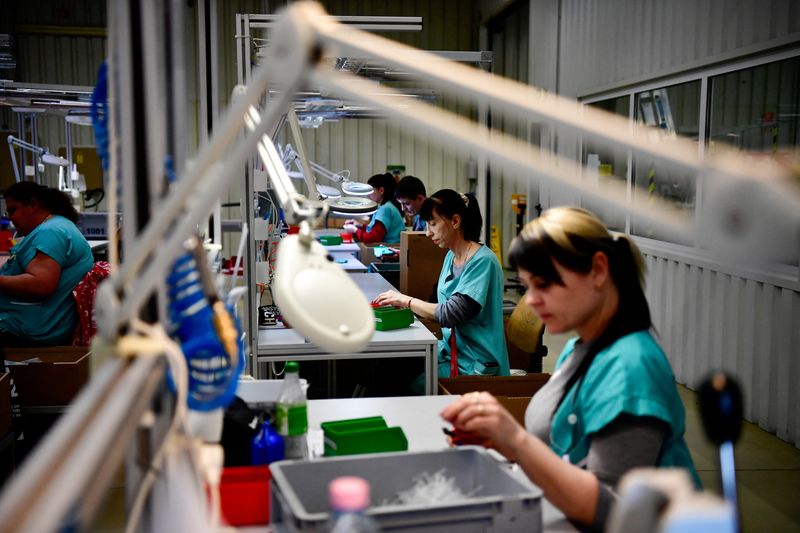
By Gergely Szakacs, Jason Hovet and Maria Martinez
BUDAPEST/PRAGUE (Reuters) - The sickly state of the German economy is the next big challenge for the export-reliant countries of central Europe, which are still recovering from some of the world's worst inflation spikes in the wake of the COVID-19 pandemic.
Close trade ties with Germany and its once-mighty auto sector were for years a boon for the region since the collapse of communism. But now those ties risk becoming a drag on the economies of Hungary, Czech Republic and Slovakia.
Already, some local companies reliant on ties with Germany are trying to tap deeper into other overseas markets and branch into industries like defence to mitigate the weakness of their large western neighbour, where another year of near-recession looms.
However such efforts come at a time of major geo-political uncertainties, with the Ukraine war, Middle East conflict and rising protectionism. Despite the push into the defence sector, all of these factors could hamper the efforts of the region's companies.
"Economic disruption in the region's most important trade partner, and persistent weakness in the auto sector, pose additional risks of economic setback to the CEE region," said Dawn Holland, Director, Economic Research at Moody's (NYSE:MCO) Analytics.
Central Europe's inflation surge, led by eye-watering levels at 25% in Hungary last year, has prompted central banks to lift borrowing costs to their highest in two decades, with Czechs enduring the most sustained fall in real wages, now spanning eight successive quarters.
German companies had annual turnover of some 250 billion euros ($270 billion) in central Europe in 2021, employing about 1 million people directly and many more through suppliers, according to Germany's Bundesbank.
The Czech Republic and Hungary rely on Germany for a third and a quarter of their exports respectively, with Slovakia sending a fifth of its exports there based on a tally by S&P Global. Poland is seen less exposed because of the strength of its more diversified domestic economy, with its exports less dependent on car manufacturing.
The best scenario for most companies interviewed by Reuters would be stagnation in turnover this year, though some did not rule out an outright decline in revenue and possible job cuts.
Building on feedback from clients, Hungary's DGA Gepgyarto es Automatizalasi Kft, which makes steel structures, welded components and custom manufactured machinery, had been planning a 50% capacity expansion to meet the expected growth in demand over three years from 2023 to 2025.
"This (higher) demand had evaporated," Tamas Tornai, Executive Director of the holding company that controls DGA told Reuters. Even so, DGA is going ahead with its 2.5 billion forint ($6.95 million) expansion to serve the booming defence industry.
WIPED OUT
Germany's car sector is not only struggling with weak sales in its U.S. and European markets but obstacles ranging from high energy prices to the global shift to e-mobility that is forcing a rethink of the future of internal combustion engines.
Within central Europe, Hungary has led a charge in attracting investments in battery and electric car manufacturing from China, positioning itself as a meeting point for Eastern and Western investors.
"There is a very strong decline in car sector demand, caused by inflation, interest rates and economic uncertainty, which nearly wiped out private buyers from the market," said Tamas Mogyorosi, Business Development Manager at Alap Group.
He said the company, which provides quality management and other services for car sector, aerospace and electronics industry clients, tried to make up for a decline in western European markets by ramping up orders from Asian clients.
Otto Danek, vice-chairman of the Czech Exporters' Association, said the sector has seen a sharp cooling since the second half of 2023 due to the weakness in Germany.
"A relatively small drop in demand from this territory has a significant impact on the entire export segment," said Danek, who owns Atas Elektromotory Nachod, a company making small electric motors.
"We are looking for new markets, more so in Europe ... but such a shortfall cannot be replaced in half a year."
Agrikon KAM, which makes components for agricultural machinery, serving mostly German clients, projects a 10% fall in revenue in 2024, which could lead to a 5% to 10% fall in its headcount by the middle of the year. It says a possible rise in sales to the U.S. will not fully offset the weakness in Europe.
Rating agencies say that weakness could complicate efforts to rein in budget deficits, which S&P Global says will remain "exceptionally wide" in historical terms for the region this year.
"The more protracted weakness in Germany is one of the top risks we see for CEE," said Karen Vartapetov, Director, Lead Analyst for CEE & CIS Sovereign Ratings at S&P Global.
"It could weigh on medium-term growth in CEE and further undermine what already appear to be challenging fiscal consolidation plans."
($1 = 0.9241 euros)
($1 = 359.56 forints)
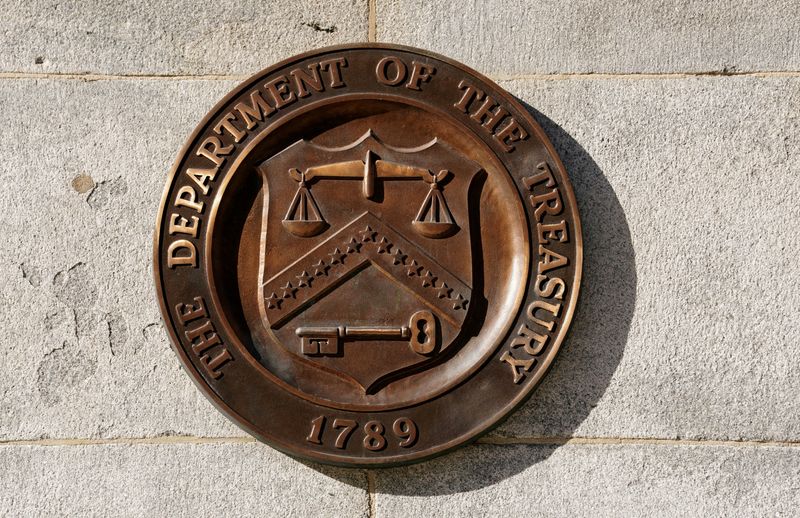
By Gertrude Chavez-Dreyfuss
NEW YORK (Reuters) - The U.S. Treasury on Monday said it expects to borrow $760 billion in the first quarter, $55 billion below the October estimate primarily due to forecasts for increased net fiscal flows and higher cash balance.
The first-quarter financing estimate assumes a cash balance of $750 billion at the end of March, the Treasury said in a statement.
The benchmark U.S. 10-year Treasury yield dropped to a more than a one-week low of 4.059% after the announcement. It was last down 9.2 basis points (bps) at 4.068%.
"The market moved on this information which just shows you how sensitive it is to refinancing estimates," said Gennadiy Goldberg, head of U.S. rates strategy at TD Securities in New York.
"But historically these estimates don't mean very much except for potentially, marginally less bill supply in the short term."
The Treasury also announced it expects to borrow $202 billion in the second quarter, as it projects a cash balance of $750 billion at the end of June.
It also said in the fourth quarter of 2023, the Treasury borrowed $776 billion in net marketable debt, in line with estimates released in October. It ended the fourth quarter with a cash balance of $769 billion.
The Treasury explained that the end-December cash balance was $19 billion higher than the October forecast due to other sources of financing such as the lower-than-estimated discount on marketable borrowing.
"The Treasury has already built sufficient cash balance," TD's Goldberg said.
"Now it's a question of: to what extent the Treasury will be or will not be increasing auction sizes. I think the market is thinking, reading this report, that the Treasury can slow down the pace of auction size increases but I don't know if that's the right takeaway at this point."
The Treasury will announce its refunding news, which will outline the upcoming auction sizes for bill, notes and bonds, on Wednesday at 8:30 a.m. ET (1330 GMT). It will likely announce a final quarter of nominal coupon auction size increases as the government's financing needs remain high.
TD projects funding requirements to rise gradually to $1.85 trillion this year and $1.9 trillion next year, as it anticipates fiscal deficits increasing in the coming years.
Thomas Simons, U.S. economist at Jefferies, wrote in a research note that he expects Treasury to announce a $121-billion package, higher than previous auctions. He anticipates $54 billion in three-year notes, $42 billion in 10-year debt and $25 billion in 30-year bonds. The auctions, he said, will take place on Tuesday, Wednesday and Thursday next week.

PARIS (Reuters) - French President Emmanuel Macron has told the European Commission that it was impossible to conclude trade deal negotiations with South America's Mercosur bloc and understands the EU has put an end to the talks, his office said on Monday.
Farmers have staged massive protests in France over the past few weeks, angry about rising costs and cheap imports, following similar action in other European countries, including Germany and Poland. French farmers have in particular objected to ongoing talks on a trade deal between the EU and Mercosur nations, which they say would allow cheap food imports that do not meet strict EU standards.
"(Macron) has very firmly reiterated to the Commission the fact it was impossible to conclude talks in these conditions," a French presidential adviser told reporters ahead of Thursday's EU summit.
The adviser added that the EU understood it was impossible to reach a deal in this context and that EU talks with Mercosur countries had been stopped.
"It is our understanding it has instructed its negotiators to put an end to the negotiation session underway in Brazil and in particular cancel the visit of the Commission's vice-president that had been envisaged in view of a conclusion," he added.
The Commission said that EU and Mercosur technical experts remained in contact, including meetings on Jan. 25-26 in Brazil, but some important questions remained open.
"The EU focus remains on ensuring that the agreement delivers on the EU’s sustainability goals, while respecting the EU’s sensitivities in the agricultural sector," a spokesperson said.
France has repeatedly expressed reservations about the EU-Mercosur deal, the text of which was agreed in 2019 after 20 years of on-off negotiations. Several other EU members back the deal. Talks resumed after the EU sought assurances on climate change and deforestation from Mercosur countries, a customs union formed by Brazil, Argentina, Uruguay and Paraguay.
In Brasilia, diplomats said Macron was under pressure to defend French agricultural issues and his views did not represent those of the European Commission, with talks expected to continue in the coming months.
Brazil's foreign ministry declined to comment on Macron's statements, but a ministry source said that the talks "are not carried out with individual countries or presidents, but between Mercosur and the European Commission."
EU and Mercosur trade negotiators met in Brasilia for two days last week but reported "limited progress," according to one diplomat involved in the talks, who was sceptical that the deal could be concluded before the World Trade Organization (WTO) ministerial meetings at the end of next month as some had hoped.
"Negotiations are proceeding slowly in the right direction. But it will take more time," another diplomat told Reuters.
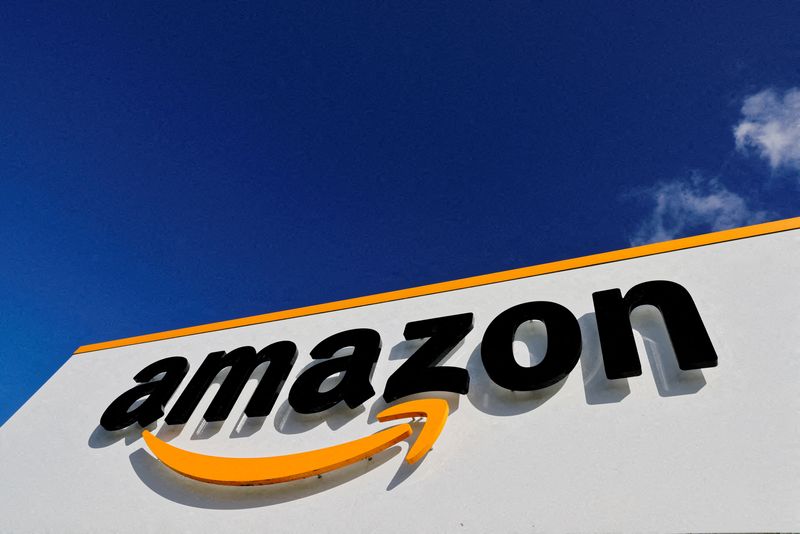
By David Shepardson
WASHINGTON (Reuters) -Amazon and robot vacuum maker iRobot (NASDAQ:IRBT) said Monday they would end their plans to merge in the face of opposition from EU and U.S. antitrust regulators.
iRobot announced a significant restructuring plan to reduce costs and said it would cut about 31% of its workforce, or 350 jobs. The company also said founder Colin Angle has stepped down as its CEO of the Roomba robot vacuum manufacturer.
Angle said given the current challenges, he and the board "mutually decided that iRobot will be better served by a new leader with turnaround experience."
Amazon (NASDAQ:AMZN) said its proposed $1.4 billion acquisition of iRobot had no path to regulatory approval in the European Union.
EU antitrust chief Margrethe Vestager said Monday its in-depth investigation preliminarily showed "the acquisition of iRobot would have enabled Amazon to foreclose iRobot's rivals by restricting or degrading access to Amazon stores."
Reuters reported earlier this month the deal would be blocked by European Commission antitrust regulators and that its main concerns were that Amazon could thwart iRobot rivals on its online marketplace, especially in France, Germany, Italy, and Spain.
Amazon could have delisted rival robot vacuum cleaners, reduce visibility of rivals or raised costs of iRobot's rivals to advertise and sell their robot vacuum cleaners on Amazon's marketplace, Vestager added.
Separately, the Federal Trade Commission was poised to reject Amazon's deal before the companies announced they were abandoning it, a source told Reuters.
The FTC staff met with Amazon last week to inform them they planned to recommend the commission vote to sue to block the acquisition, the source added, saying the commission was set to hold a final meeting on Monday with Amazon before the commission could have voted to approve a legal challenge to the merger.
Amazon announced the deal in August 2022. The world's largest online retailer, which already owns Alexa and Ring, was pushing to expand its stable of smart home devices as well as expanding the e-commerce giant's virtual healthcare.
"We're disappointed that Amazon's acquisition of iRobot could not proceed," said David Zapolsky, Amazon's general counsel. "We're believers in the future of consumer robotics in the home and have always been fans of iRobot's products," he added in a statement.
Bedford, Massachusetts-based iRobot said it expects to report full-year 2023 revenue of $891 million, a 25% reduction and a loss of between $265 and $285 million. Under the terms of the merger agreement, Amazon will pay iRobot a $94 million termination fee.
Amazon has had a mixed record with competition regulators in recent years, completing a deal for healthcare provider One Medical and MGM's movie library.
But it faces a lengthy court battle in a Seattle federal court with the FTC over accusations the company uses illegal strategies to boost profits at its online retail empire, including an algorithm that allegedly pushed up prices by more than $1 billion.
iRobot shares fell 7.2% in afternoon trading Monday. Since first reports the deal might be blocked by EU regulators two weeks ago, iRobot shares have fallen by half. Amazon shares rose nearly 1%.
Critics opposed the deal, saying it would strengthen Amazon's already powerful position in smart home devices.
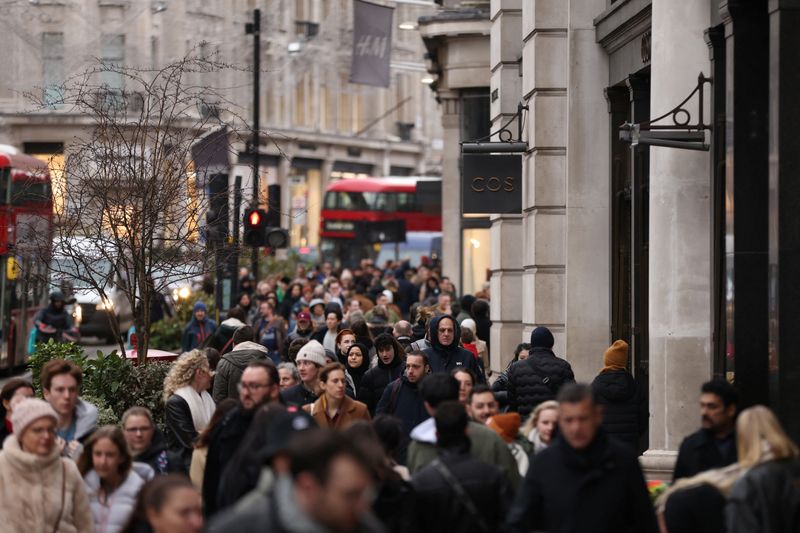
LONDON (Reuters) - Prices in British shops rose at the slowest annual pace since May 2022 this month, the British Retail Consortium (BRC) said on Tuesday, adding to signs of easing inflation pressures ahead of this week's Bank of England (BoE) policy decision.
The BRC said shop price inflation dropped to 2.9% in January from 4.3% in December, driven by heavier discounting of goods in January sales this year than in 2023.
Non-food prices were up 1.3%, the least since February 2022, while food prices rose 6.1% on the year - the smallest increase since June 2022 - as lower prices for tea and milk were partly offset by higher alcohol duties.
Mike Watkins, head of retailer and business insight at NielsenIQ, which provides data for the BRC, said lower wholesale costs were allowing supermarkets to cut the price of some goods.
"However, consumer demand remains fragile as most households are yet to feel better off after nearly 2 years of inflation," he said.
Britain's headline rate of consumer price inflation, which covers a wider range of goods and services than the BRC data, rose to 4.0% in December from 3.9% in November, its lowest since September 2021.
Even so, inflation has fallen faster than the BoE forecast at the start of November - largely due to a big drop in energy costs. Many economists expect the central bank to lower its near-term inflation forecasts when it announces its next interest rate decision on Thursday.
However, with inflation still double the BoE's target, the central bank is likely to indicate it remains some way from considering cutting interest rates from their current nearly 16-year high of 5.25%. Financial markets see a first quarter-point cut in May or June.
The BRC data was based on prices collected between Jan. 1 and Jan. 7.
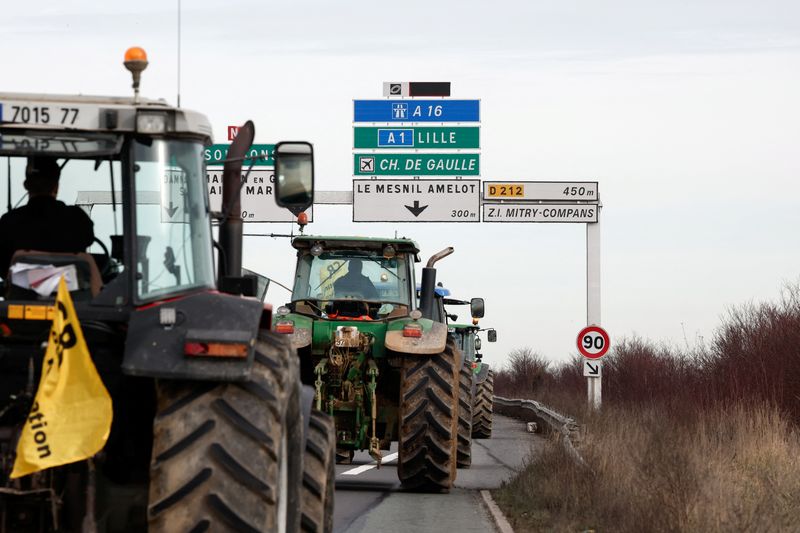
PARIS (Reuters) -French farmers maintained nationwide protests on Saturday and kept their threat of roadblocks around Paris, arguing government measures to quell the demonstrations did not go far enough to meet their demands for better pay and living conditions.
On Friday, Prime Minister Gabriel Attal's government dropped plans to gradually reduce state subsidies on agricultural diesel, and announced other steps aimed at reducing the financial and administrative pressures faced by many farmers.
Yet the FNSEA, France's biggest farming union, said it would keep up its protests and many farmers remained at roadblocks set up by motorways and major roads on Saturday.
"On Monday, we will be heading for Paris," farmer Vincent Gimneste told BFM TV, at a roadblock in southern France.
Two local farmers trade unions representing those working in the countryside around Paris also told French media they were targeting causing major disruption in the capital on Monday, possibly around the Rungis food market.
Prime Minister Gabriel Attal will visit a farmers' site on Sunday, said Attal's office, as the government tries to prevent the protests from gaining in momentum.
Demonstrators also held a silent march in the northern French town of Beauvais on Saturday, to pay tribute to farmers who have died in recent years, with some having committed suicide due to the stress of their working conditions.
France is the European Union's biggest agricultural producer and the French farmers' protests follow similar action in other European countries such as Germany and Poland, with many demonstrators saying they are being hit by globalisation and foreign competition.

